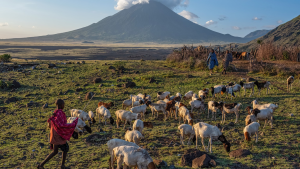“This Will Finish Us.” – Tanzania

How Gulf princes, the safari industry, and conservation groups are displacing the Maasai from the last of their Serengeti homeland
It was high safari season in Tanzania, the long rains over, the grasses yellowing and dry. Land Cruisers were speeding toward the Serengeti Plain. Billionaires were flying into private hunting concessions. And at a crowded and dusty livestock market far away from all that, a man named Songoyo had decided not to hang himself, not today, and was instead pinching the skin of a sheep.
“Please!” he was saying to a potential buyer with thousands of animals to choose from on this morning. “You can see, he is so fat!”
The buyer moved on. Songoyo rubbed his eyes. He was tired. He’d spent the whole night walking, herding another man’s sheep across miles of grass and scrub and pitted roads to reach this market by opening time. He hadn’t slept. He hadn’t eaten. He’d somehow fended off an elephant with a stick. What he needed to do was sell the sheep so their owner would pay him, so he could try to start a new life now that the old one was finished.
The old life: He’d had all the things that made a person such as him rich and respected. Three wives, 14 children, a large compound with 75 cows and enough land to graze them—“such sweet land,” he would say when he could bear to think of it—and that was how things had been going until recently.
The new life: no cows, because the Tanzanian government had seized every single one of them. No compound, because the government had bulldozed it, along with hundreds of others. No land, because more and more of the finest, lushest land in northern Tanzania was being set aside for conservation, which turned out to mean for trophy hunters, and tourists on “bespoke expeditions,” and cappuccino trucks in proximity to buffalo viewing—anything and anyone except the people who had lived there since the 17th century, the pastoralists known as the Maasai.
They were the ones tourists saw through their windshields selling beaded key chains at the gates of Serengeti National Park, or performing dances after dinner at safari lodges. They were famous for their red shawls and recycled-tire sandals. They grazed their cattle with zebras and giraffes, and built mud-and-dung houses encircled by stick fences barely distinguishable from the wild landscape. They were among the lightest-living people on the planet, and yet it was the Maasai who were being told that the biggest threat to conservation and national progress was them. Their whole way of life had to go.
And so Songoyo, after considering his alternatives, had devised a last-ditch plan for his own survival, one that had brought him to a town in Kenya called Aitong, where a cool wind was slapping sand and dung into his face as he scanned the market for buyers. He was far from home, roughly 65 miles north of the village in Tanzania where he had been tear-gassed and shot at for the first time in his life. He had seen elderly men beaten and guns fired at old women, and now it was down to this: He was a herder for hire, working for a distant relative, trying to make enough money to buy one single cow.
“Come!” he called to the buyers who kept passing his herd and weaving through the bleating mass. “You will not find any better!”
This was his plan: one cow, because that was the starting point of what it meant to be a Maasai man, which was what he still wanted to be.
Full article here: https://archive.is/20240410125831/https://www.theatlantic.com/magazine/archive/2024/05/maasai-tribe-tanzania-forced-land-evictions-serengeti/677835/



